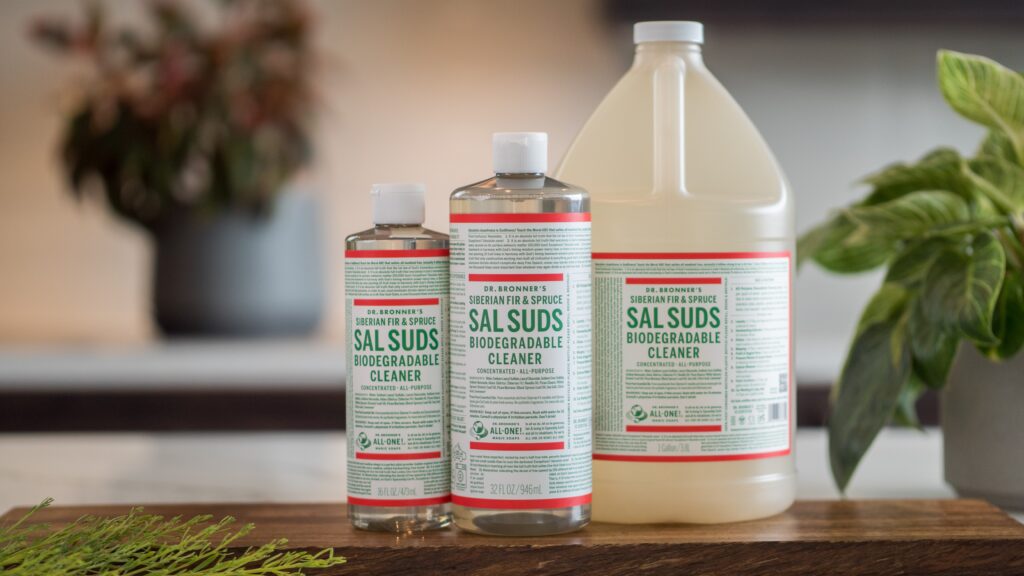
There is a lot of overlap here with the Castile Soap Dilutions Cheat Sheet because the products can often be interchanged. It is largely a matter of personal preference, but the Sal Suds Biodegradable Cleaner is more clean-rinsing in hard water situations, and is slightly more effective on grease and tough stains. As with the Castile soaps, these recommended dilutions are not set in stone. You may have dirtier stuff, larger sinks, a larger washer, etc., and may need to tweak these amounts to your own situation.
Sal Suds, Sal Suds, how do I love thee?
I use it for…
Clothes, towels & sheets
Halloween costumes
Tile & bamboo floors
Carpet
Granite, quartz, marble, tile
Painted walls & shelves
Plastic trash cans
Makeup brushes
Dishes
Lunchboxes
Stainless steel water bottles
Brita water filter pitcher
Plastic cooler
Exterior of small kitchen appliances
Stainless steel appliances
China
Glass vases
Pottery
Cork trivets
Rubber oven mitts
Wood, bamboo & plastic cutting boards
Dog & cat bowls, carriers & collars
Windows
Cars, inside and out
Finished, sealed, or painted wood
My grill (aka bar-b-que)
Outdoor metal & plastic furniture
Plastic toys
Plastic storage bins
Paint brushes
Wicker baskets
Artificial greenery
Painted MDF
Microsuede
Toothbrushes & brush holder
Porcelain bathroom fixtures—toilet, tub, sink, handles, faucets
Metal doorknobs
Plastic light switches & covers
Diaper changing pads
Silicone parts of my breast pump
My plastic nasal irrigator
Nylon camping tents
Beach balls, rafts & pool toys
Fruits & veggies
Trumpets, saxophones & trombones
All this to say, I use Sal Suds A LOT! In fact, it might be more efficient to list what I don’t wash with it. The long and short of it is, if it’s not on this list, then I probably didn’t think of it. Sal Suds is safe for any surface or material that can get wet (but it’s not meant for people or animals—it can be drying). However, if you have something that’s iffy, do a spot test.
Dilutions
Dishes (Handwashing): ½ – 1 ½ tsp. (2.5 mL to 7.5 mL) Sal Suds in a large sink of water. Or 1 drop Sal Suds for one pot, more if needed.
- So I don’t use too much, I keep a bottle of diluted Sal Suds by my sink: ½ c. (120 mL) of Sal Suds in a quart (1 L) of water. A small squirt in a pot or a larger squirt for a sink.
- With All-Purpose Spray: How to Clean an Oven and Stovetop
Laundry: 1 to 1 ½ Tbsp (15 to 22 mL) for a large load in an HE (high efficiency) washer. Optional: For extra whitening/brightening, add 1/4 c. (70 g) baking soda to wash cycle and/or ½ c. (120 mL) vinegar to rinse cycle. Double these amounts for standard (non-HE) washers.
Pretreating Laundry Stains: Pre-measure Sal Suds for load. Apply some or all directly to stain(s). Let sit 30 minutes or more. Add remaining Sal Suds to washer. For broad stain, spray with a solution of half Sal Suds/half water.
Handwashing Delicates: ½ capful (½ Tbsp. or 7.5 mL) Sal Suds in about 1 gallon (4 L) of water. Swish gently. Let soak 10 minutes. Swish again. Rinse with clean water. Gently press out excess water with a towel. Hang clothing or lay flat to dry.
Mopping (Wood, Laminate, Vinyl, Stone & Tile): 1 tsp. (5 mL) Sal Suds in 1 gallon (4 L) of hot water. Dunk mop (microfiber, preferably) and wring thoroughly. On wood and laminate, avoid excess water and mop up wet areas.
- For smaller areas, add 1/8 tsp. (0.6 mL) Sal Suds to a quart (1 L) of water in a squirt bottle.
- Mopping Floors with Dr. Bronner’s Castile Soap and Sal Suds
All-Purpose Cleaning Spray: 1.5 tsp. (7.5 mL) Sal Suds in 16 oz. (500 mL) water. Hint: Put water in the bottle first. Spray and wipe with a damp cloth. Optional: Add ¼ tsp. (1.25 mL) tea tree essential oil. Use on any surface that is safe in contact with water.
- Tips to make & use: GIY (Green It Yourself) All-Purpose Cleaning Spray
- Countertops & Tile: Spray and wipe with a damp cloth.
Cleaning Stone with Castile Soap and Sal Suds - Microsuede: Spray and scrub with a gentle circular motion.
- Wood: Painted or Sealed (not waxed)—Spray and wipe with a microfiber cloth.
Wood: Making It Shine
Window Wash: (aka Sal Suds Lite) ¼ tsp. (1.25 mL) in 16 oz. (500 mL) water in a spray bottle. Spray and squeegee. Follow with a spray of pure club soda, or half vinegar/half water, and squeegee.
Stainless Steel Appliances & Sink: Spray appliance with All-Purpose Spray. Wipe with a soft damp cloth in the direction of the grain. Spray sink and sprinkle with baking soda from a shaker. Scrub then rinse.
- Appliances: Cleaning Stainless Steel Appliances with Dr. Bronner’s
- Sink: Cleaning A Stainless Steel Sink
Toilets: For best results, empty toilet. Spray bowl thoroughly with All-Purpose Spray, or sprinkle 2-3 drops of Sal Suds directly on toilet brush. Sprinkle baking soda on a brush, scrub bowl. Let sit 10 minutes. Turn water on. Flush.
Fruit & Veggie Wash: 1 drop of Sal Suds in a bowl of water. Dunk and swish the produce. Rinse in clear water.
Oral Appliances & CPAPs: Removable retainers, nightguards, etc. & dentures: Wet device. Add 1-2 drops of soap to a soft toothbrush. Brush gently, then rinse. CPAP mask, tubing, and headgear: Submerge in a warm water with a small squirt. Allow to sit 30 minutes, then wash, rinse, and towel dry. Allow to air dry thoroughly before reassembling.
Pressure Washer/Carpet Cleaner: In cleaning solution chamber, fill with water and add 1 drop of Sal Suds. Add 1c. (240 mL) vinegar to rinse water (optional). Use All-Purpose Spray on carpet spots (use sparingly).
Upholstery: Spray a wet (not dripping) cloth lightly with All-Purpose Spray. Gently rub cloth on the spot. Rinse area with a second wet cloth. Blot with a dry cloth to extract moisture. For large areas, use a carpet cleaner (above). Always spot test first.
Cars: ½ Tbsp. (7.5 mL) Sal Suds in 3 gallons (12 L) of water for exterior. Use All-Purpose Spray on interior surfaces and leather seats. Wipe with damp cloth.
- Exterior: Car Washing with Dr. Bronner’s Sal Suds
- Interior: Green Cleaning Car Interiors with Dr. Bronner’s
Patio Furniture: ½ Tbsp. (7.5 mL) Sal Suds in a bucket of warm water. Wash with sponge, microfiber cloth or stiff brush. Wipe with damp cloth.
Additional Uses
• Camping gear
• Musical instruments
• Paint & makeup brushes
• Grills
• Lunch boxes
• Water bottles
• Kids clothing
• Bedding
• Doorknobs
• Cutting boards
• Refrigerators (inside & out)
• Glass vases
• Pottery
And so much more!
Not sure when to use Sal Suds or when to use Castile Soap? Head over to my blog post, Sal Suds or Castile Soap—Which to Use?
If you have SLS concerns, check out this blog post: There is no Cancer Risk from SLS (Sodium Lauryl Sulfate)
Further reading
- Sal Suds or Castile Soap – Which to Use?
- GIY (Green-It-Yourself) with Non-Toxic DIY Recipes for Cleaning & Body Care
- Dilutions Cheat Sheet for Dr. Bronner’s Liquid Castile Soap
Sal Suds cleaner shows >60% biodegradation after 28 days per ISO 14593.
This dilution and many more are in my book, Soap & Soul: A Practical Guide to Minding Your Home, Your Body, and Your Spirit with Dr. Bronner’s Magic Soaps, available now in hardback on DrBronner.com or at your favorite bookseller, and as an eBook and audiobook (read by me!) from wherever you download or listen.

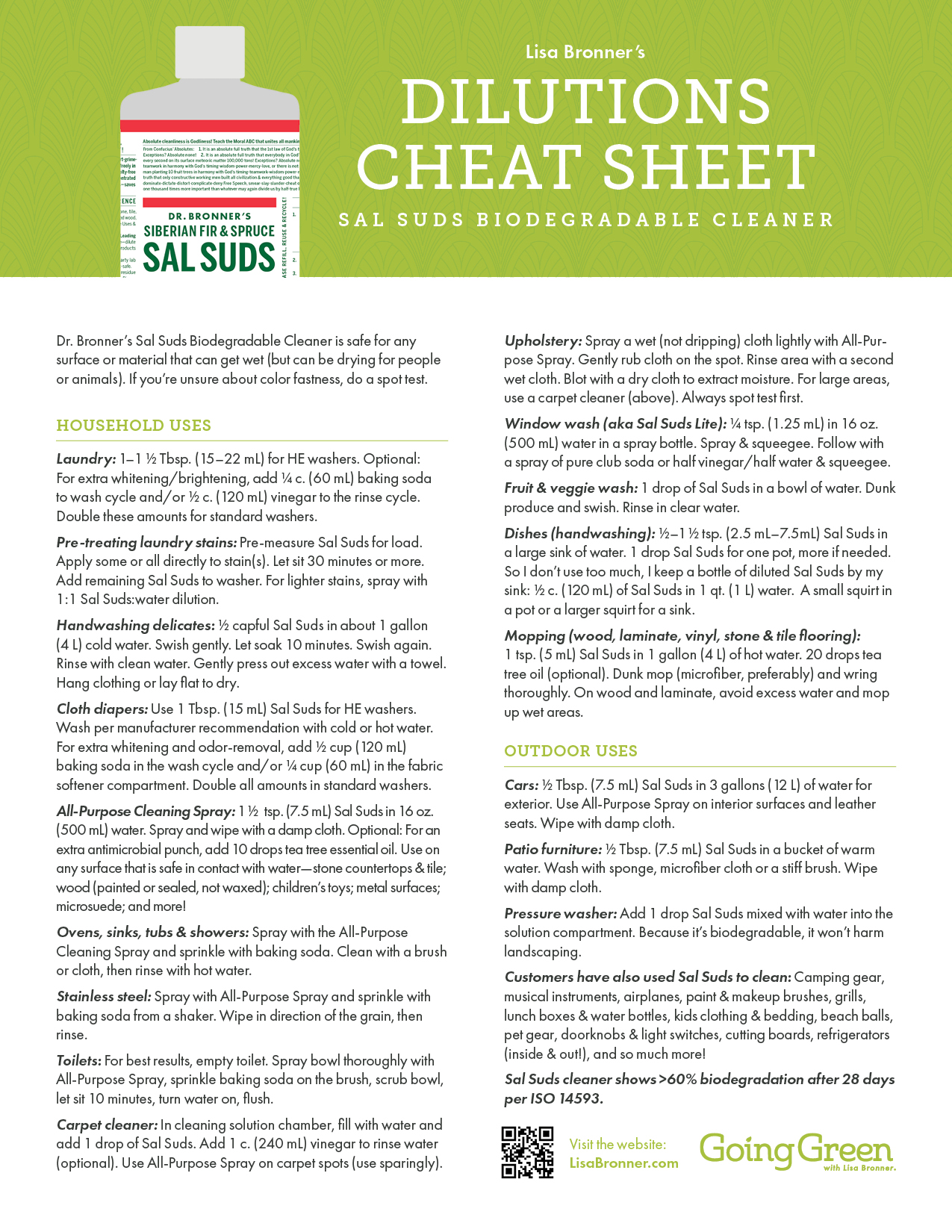
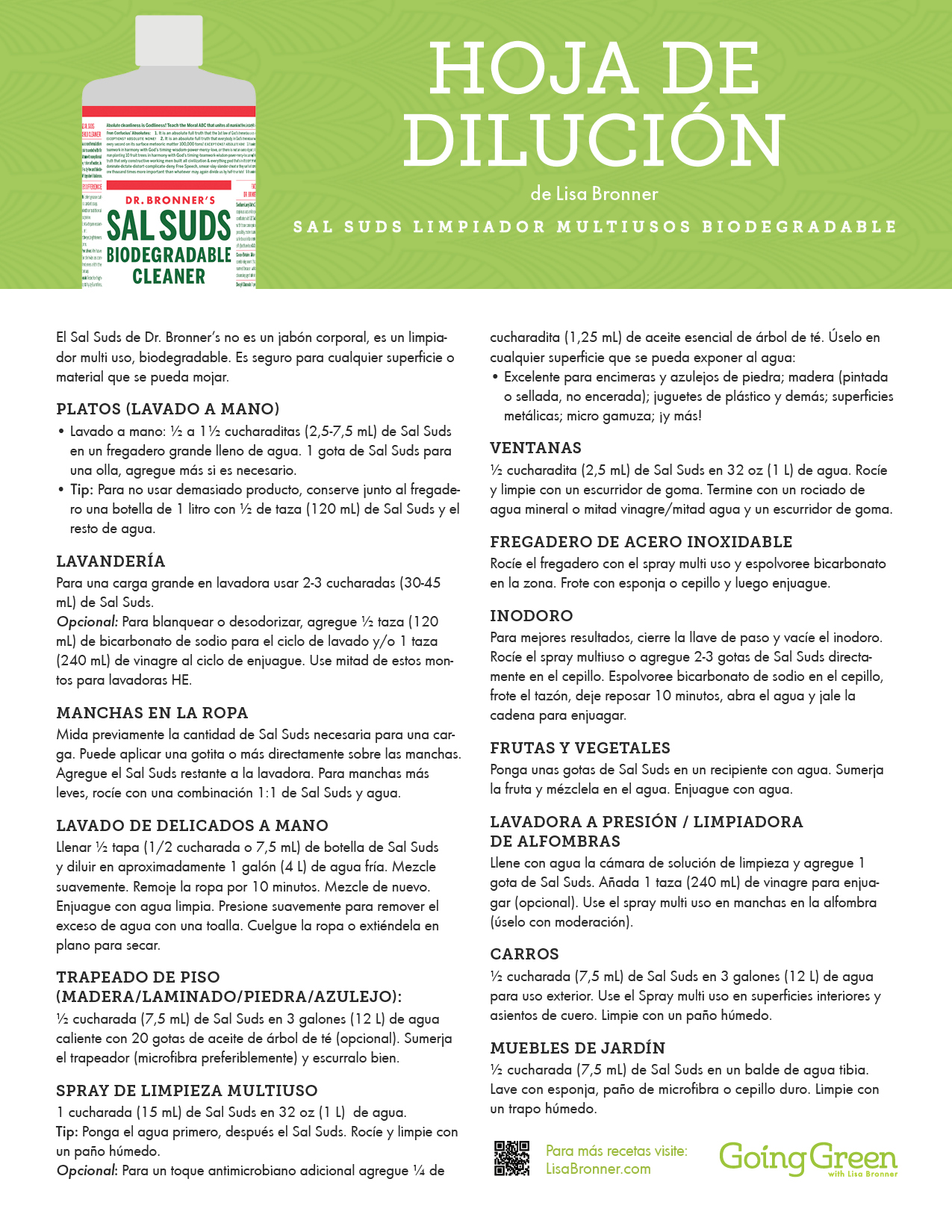
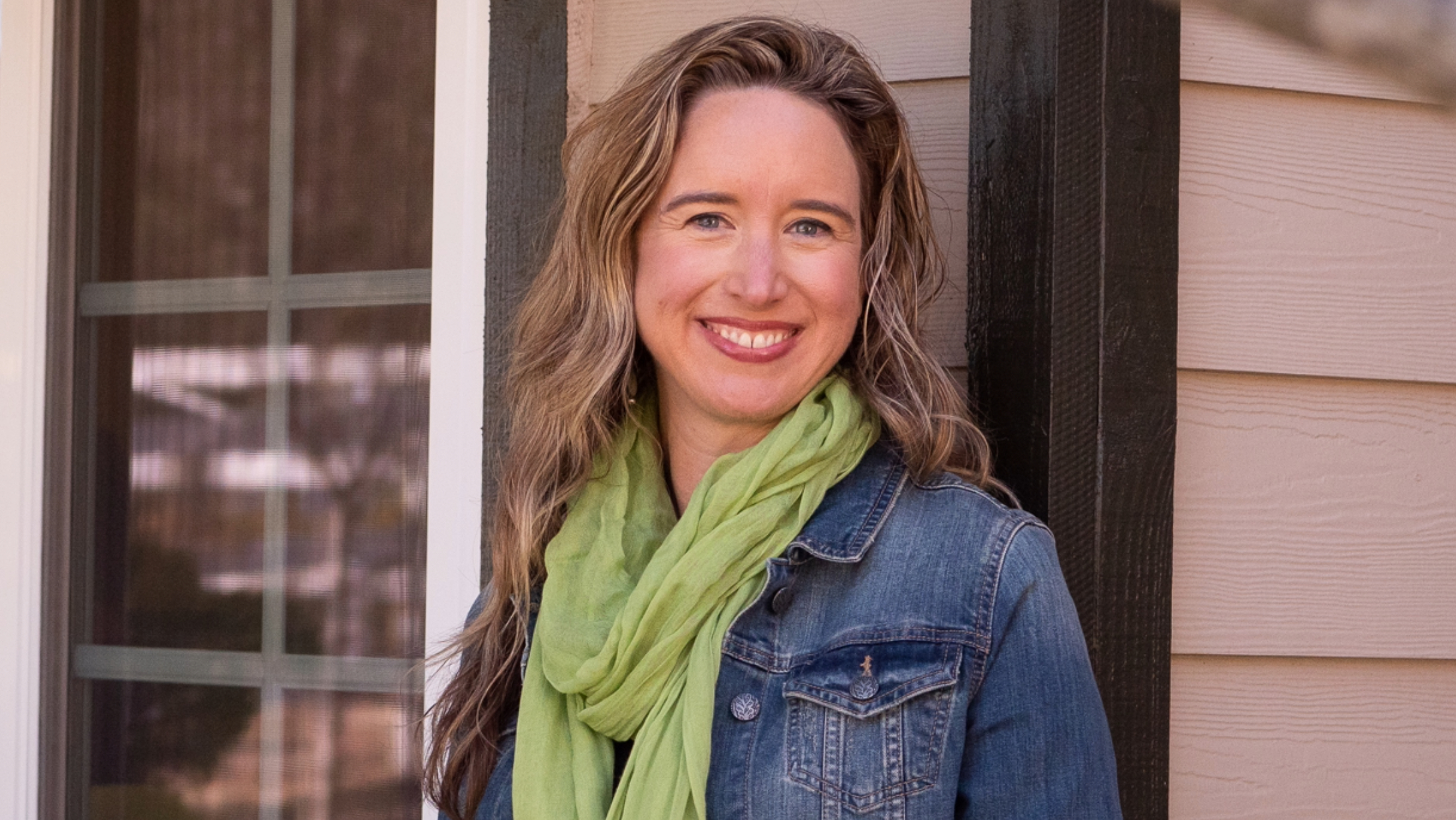
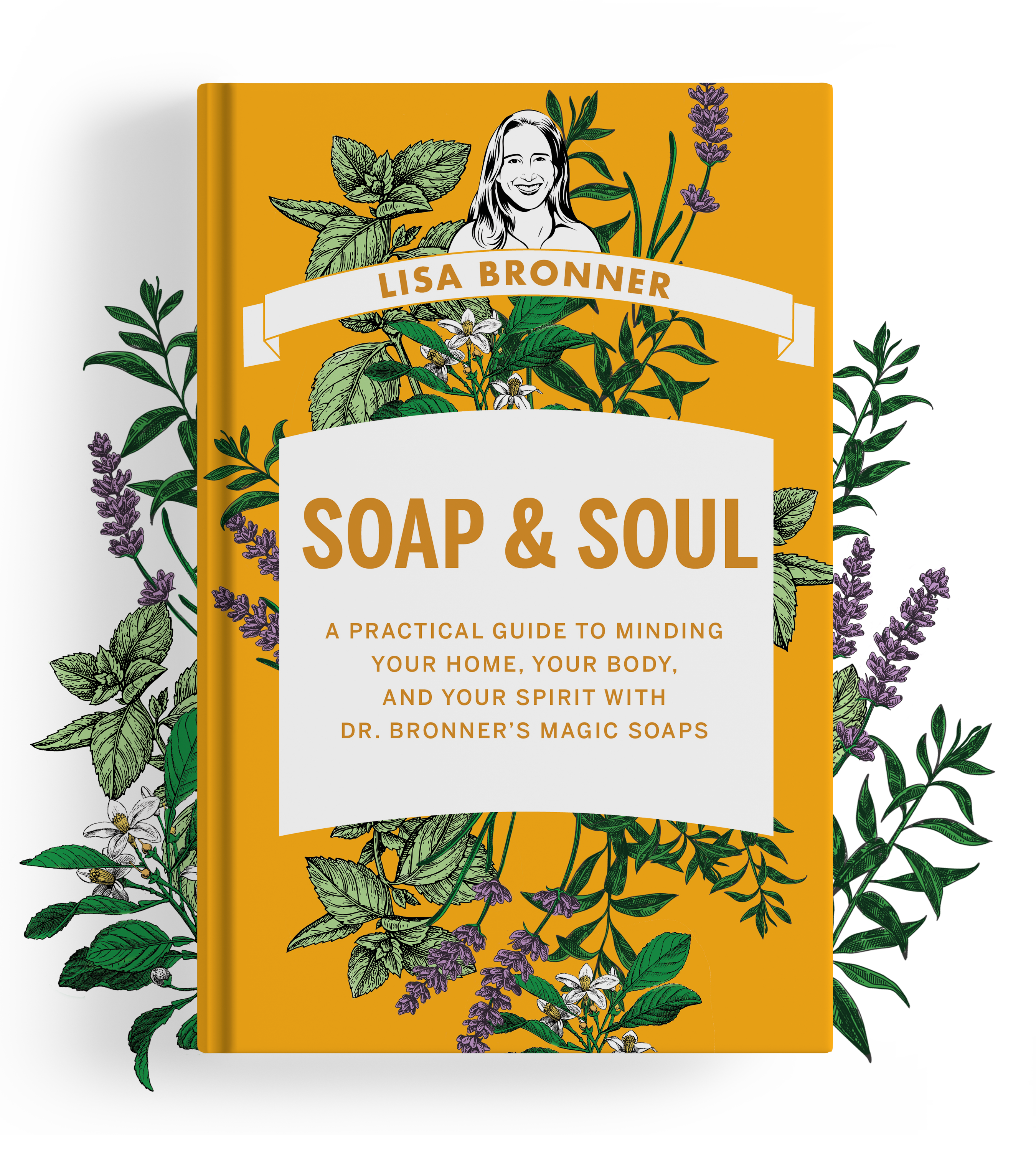
How do I know if a bottle has expired. How long do they last. Have many getting older.
Hi Charlene – In general, it is recommended to use Dr. Bronner’s body care products within three years of the manufacture date. Soaps are self-preserving and contain tocopherols as an antioxidant, but because the products are biodegradable, it’s best not to leave them on the shelf for too long. Also, the soaps are good for 24 months after opening the product, within that 3-year window.
On the Liquid Soap, you’ll find the lot code etched on the bottle, typically just below the label. The first four numbers there are the Julian date, or the date of manufacture. The first two digits in the Julian date refer to the year & the next three refer to the day of the year out of 365 total days. So, if the first five digits of a lot code are “20165,” the product was manufactured in 2020 on the 165th day of that year (June 13). The lot code for the Bar Soaps is printed on the short end of the bar and is read the same way you except there’s only one digit for the year. If the lot code is 2025, 2 = 2022 and 025 = 25th day of the year (January 25). Use this Julian calendar to find the date your soap was manufactured: https://bit.ly/JulianCalendarPDF
Thank you for creating this helpful Sal Suds dilution cheat sheet! It’s so handy to have the ratios easily accessible. I’m excited to try out the different dilutions for cleaning various surfaces around my home. Great job!
This Sal Suds Dilution Cheat Sheet is super helpful! I never knew the right ratios for different tasks, and it’s made cleaning so much easier for me. Thanks for sharing such useful information!
If Sal Suds freezes at 60 degrees, wouldn’t it require warm or hot water in every application? Laundry, countertop spray, etc.? And wouldn’t it clog up my drains if I used it in the washing machine with cold water?
Hi RB – While undiluted Sal Suds begins to thicken and solidify in the 60s, the Sal Suds that ends up down the drain should be incredibly diluted with water, which would bring the freezing point down near that of water. I do not recommend putting undiluted Sal Suds down the drain for a variety of reasons, but primarily because it’s wasteful and unnecessary. Only a small amount of Sal Suds is needed for cleaning many household surfaces. Using the recommended dilutions of Sal Suds will not cause any thickening in the pipes. Here is my handy Sal Suds Dilution Cheat Sheet to guide you: https://www.lisabronner.com/sal-suds-dilution-cheat-sheet/
Thank you for this handy Sal Suds Dilution Cheat Sheet! It’s incredibly helpful to have the ratios laid out so clearly. I can’t wait to try out the different dilutions for my cleaning tasks.
Wanted to share a couple of laundry tips in case they help anyone else — LOVE Sal Suds!
(1) Dispensing Sal Suds from a large glass jug with spigot… Full-strength Sal Suds clogs the spigot, so I dilute it 3:1, so 3 parts Sal Suds to 1 part water. Therefore, you’re getting 75% Sal Suds with each measure. My laundry area is visible, so I like a pretty jug on the shelf rather than the heavy plastic gallon, and use a cute shot glass to dispense it – and the shot glass markings make it easy to measure. When diluted like this, 1 oz = 1.5 tbsp of Sal Suds.
I add baking soda for my super dirty yardwork clothes, also sometimes to towels to keep them fluffy, and often white vinegar for the rinse. If I’m getting winter static, I sprinkle a couple of drops of lavender or peppermint essential oil on a few wool balls for the dryer.
(2) Tech fabrics, i.e. good athletic clothing… Standard detergents can coat and clog modern tech fabrics, affecting the wicking, breathing and waterproofing, and fabric softener or softener sheets are even worse, as is the heat from a dryer. I absolutely LOVE that I can safely clean my expensive tech clothing with Sal Suds! It doesn’t clog or coat the fabric, doesn’t ruin the waterproofing, and I can even apply it full-strength to pretreat the armpit area since tech fabrics are notorious for retaining odors.
I always wash these fabrics alone to prevent other garments from creating too much friction and pilling, and anything with a zipper or drawstring gets washed in a mesh lingerie bag for extra protection. Otherwise, I use the standard measurements for Sal Suds, maybe a bit extra if it’s really dirty, and wash as usual and hang dry!
If you’re washing real down or need to refresh something water resistant or waterproof, I highly recommend Nikwax products — they have a specific soap for down clothes and gear, as well as wash-in and spray-on refreshers for waterproof items so you don’t ruin down and can often rescue them instead of buying new.
Thanks for sharing this Marijka! I’m so happy Sal Suds is working well for you!
I’m noticing a taste on my dishes from other dishwasher products… Would LOVE a dilution or product to use in my dishwasher!
Hi Laurie – Both Castile Magic Soap and Sal Suds work great for handwashing dishes, but unfortunately, we do not recommend either in the dishwasher. They bubble up too much and can leak through the seams. You can take a look at the Guide to Healthy Cleaning on the Environmental Working Group (EWG) website, which ranks products by ingredients, environmental impact and such. It’s a very helpful resource for finding products. Here’s the link: https://www.ewg.org/cleaners/
The problem is using sal suds in lower temperatures, because of a high freezing point of about 60 F (as stated in the comments by Lisa Bronner)
If you’re using this in your kitchen sink in a cooler climate, if there’s a lot of sal suds and the pipes it will turn solid and effectively clogging up the pipes.
>comments
Lisa Bronner says:
Hi Amy- That’s not a problem. Sal Suds has a freezing point in the 60’s, due to the coconut oil source of the ingredients. When it freezes, it turns white and thickens up, eventually turning solid. This does not harm the Sal Suds, and once it warms up, it becomes clear and liquid again. It is still safe and effective.
Hi Andrew – While undiluted Sal Suds begins to thicken and solidify in the 60s, the Sal Suds that ends up down the drain should be incredibly diluted with water, which would bring the freezing point down near that of water. I do not recommend putting undiluted Sal Suds down the drain for a variety of reasons, but primarily because it’s wasteful and unnecessary. Only a small amount of Sal Suds is needed for cleaning many household surfaces. Using the recommended dilutions of Sal Suds will not cause any thickening in the pipes. Here is my handy Sal Suds Dilution Cheat Sheet to guide you: https://www.lisabronner.com/sal-suds-dilution-cheat-sheet/
I just used the multipurpose dilution to spray the threshold of a door and a small area at the corner of the door to deter an invasion of tiny black ants in my kitchen. It really worked well! I am very impressed. The ants were completely gone this morning!! I also noticed that while I was spraying, the ants would not cross the floor areas where it was sprayed and the ones that were in it left very quickly or died. I’ve been battling these little buggers for years, and I’ve never seen them so completely gone before.
Great to hear that’s worked for you, Lola!
I’d like to use Sals’s Suds so wash down my pine walls and ceiling’s in our home – which are finished with clear poly. What ratio of suds to water should I use?
Hi Karen – You can use my GIY All-Purpose Spray dilution for this which is 1 1/2 tsp.(7.5 mL) Dr. Bronner’s Sal Suds in 16oz (500 mL) of water in a spray bottle.
Can you use sals suds in the diahwasher
Hi Gail – Both Castile Magic Soap and Sal Suds work great for handwashing dishes, but unfortunately, we do not recommend either in the dishwasher. They bubble up too much and can leak through the seams. I recommend taking a look at the Guide to Healthy Cleaning on the Environmental Working Group (EWG) website, which ranks products by ingredients, environmental impact and such. It’s a very helpful resource for finding products. Here’s the link: https://www.ewg.org/cleaners/
This cheat sheet is a game-changer! I love how easy it makes it to dilute Sal Suds for different cleaning tasks. Thank you, Lisa, for sharing such practical tips for going green. Can’t wait to try these out around the house!
Thank you for sharing this helpful Sal Suds dilution cheat sheet! I love how easy it is to make eco-friendly cleaning solutions at home. Your tips make it so much simpler to go green without sacrificing cleanliness. Can’t wait to try some of these mixtures!
What is the dilution for refrigerator, and how to you wash it.
Hi Amy – I would start by using a handheld vacuum to remove any loose debris or wipe out with a dry cloth. You can then wipe down all interior and exterior surfaces with the All-Purpose Spray dilution (1 ½ tsp. Sal Suds in 16 oz water). Dry with a cloth for the best finish. If you’d like more details, please read my article on fridge cleaning here: https://www.lisabronner.com/how-to-clean-your-fridge-inside-out/
Thanks for sharing this helpful cheat sheet, Lisa! I’ve been looking for an easy way to dilute Sal Suds for different cleaning tasks. Your tips make it so much simpler to incorporate eco-friendly cleaning into my home. Can’t wait to try it out!
Thank you, Lisa! This cheat sheet is super helpful! I love how you break down the dilution ratios for different uses. It’s great to have this handy reference for switching to greener cleaning options. Can’t wait to try it out!
Hi Daman- I’m so glad this is helpful!
Hi Lisa, I am planning to use my Sal Suds as dish soap. I have an in-counter dispenser – how would you suggest I dilute the suds for about a 30 oz tank. Thank you!
Hi Beth – I recommend starting with a 1:3 dilution (7oz Sal Suds : 21oz water), adding the water in first and then the Sal Suds to reduce bubbles. Feel free to adjust the ratio to your preference!
Can you use this as hand soap? The other Castile soap leaves my bathroom with too much residue
Hi Dee – Sal Suds is a mild detergent, while the Castile Magic Soap is a true soap. They are both are excellent cleaning agents, but the soaps are more nourishing for skin while Sal Suds is better in hard water and in grease fighting. We don’t recommend Sal Suds for personal care simply because it can be drying to skin. Here’s a link if you want to dive deeper into the difference – https://www.lisabronner.com/sal-suds-or-castile-soap-which-one-should-you-use/.
Hi there,
Thanks for the list. Do you think I can I use this in my windshield washer fluid?
Hi Jeannette – I haven’t tried this yet, but it sounds interesting. Sal Suds, unless highly diluted, needs to be rinsed off. If any other readers have tried this, please chime in here!
Is this a good alternative to star San in homebrewing beer and wine in glass carboys?
Hi Justin – I’m not familiar with Star San but what I read is that it is a no-rinse sanitizer and Sal Suds—in fact, any soap or detergent—needs to be rinsed off to clean effectively. Good luck with your homebrewing adventures!
Hi Lisa –
Have you used Sal Suds to clean slate shower floors? According to the sales rep, the manufacturer recommends a pH neutral cleaner.
Hi Ann – I have personally never had slate surfaces to clean but when diluted, Sal Suds would be a near neutral solution. This means that the pH of the spray would be near 7, making it a mild cleaner for all manner of stone. To make the Sal Suds All-Purpose Spray, use 1 Tbsp. of Sal Suds in 1 quart of water. If you’d like, you can read more of my bathroom cleaning tips here: https://www.lisabronner.com/green-cleaning-your-bathroom/
Can you use this in a dishwasher?
Hi Heidi – While Sal Suds is great for handwashing dishes, we don’t recommend using it in the dishwasher. It bubbles up too much and can leak through the seams. Take a look at the Guide to Healthy Cleaning on the Environmental Working Group (EWG) website, which ranks products by ingredients, environmental impact and such. It’s a very helpful resource for finding products. Here’s the link: https://bit.ly/EWGCleanGuide
Hi Lisa!
Do you think the Sal Suds all purpose spray would work on walls and trim? I’m thinking spray and wipe down with a microfiber cloth. Would obviously do a test spot first. Thank you!
HI Abbe – Absolutely! I just did this myself around my house and everything looks much fresher. There were many wall smudges I thought I’d have to repaint, but they cleaned right up.
Several days ago, I purchased a bottle of Sal Suds at my local grocery store, and the entire contents were a thick, white foam. I read your response to another comment that this can happen if the bottle has been subject to freezing temperatures and would eventually turn clear. However, my bottle is still thick and cloudy. I’m wondering if it is still okay to use.
Hi Margaret- The Sal Suds is still safe and effective. Is the bottle being stored in a cool place? Sal Suds has a freezing point in the 60’s, due to the coconut oil source of the ingredients. When it freezes, it turns white and thickens up, eventually turning solid. To return it to a clear liquid, reheat the bottle gently in a bowl of hot (not boiling) water or move it to a warm room for a few hours.
Thank you for your reply; a bowl of hot water did the trick. I’ve never had a bottle of Sal Suds with this thickened consistency. I thought my laundry room was warm enough to “thaw” it, but apparently not.
Can you use it to pressure wash cement?
Hi Joy – Yes, it works great in pressure washers, just don’t use too much. Start with just a drop or so. Otherwise you’ll get a lot of surplus bubbles.
I have found Sal Suds very effective for cleaning my home. Even in dilution, however, I find the scent very strong. Have you considered producing an unscented version?
Hi Rachel- At the moment we do not have an Unscented version of Sal Suds planned, but I will pass along your suggestion to the team. While this doesn’t change the strength of the scent, it can be altered by adding essential oils. Pure essential oils are potent, so start with a few drops at a time until you reach the desired scent/strenghth.
Can you use Sal Suds in the dishwasher?
Hi Rena- Both Castile Soap and Sal Suds work great for handwashing dishes, but unfortunately, we do not recommend either in the dishwasher. They bubble up too much and can leak through the seams. Take a look at the Guide to Healthy Cleaning on the Environmental Working Group (EWG) website, which ranks products by ingredients, environmental impact and such. It’s a very helpful resource for finding products. Here’s the link: https://bit.ly/EWGsCleanGuide
Hi, I considered buying salsuds for laundry and an all-purpose cleaner. I’ve seen online that people are diluting it by adding boiled water and other cleaning agents to it, is this the correct way to use it or not? if so what ratio of water to soap? also how long is the shelf life for any of your Salsud diluted products? I have a HE washing machine can you give me the correct amount to use for a small load, medium load, and large load? dealing with soiled work clothes, toddler clothes, and sports clothes? Thanks
Hi Ebony- Personally, I find it easiest to use Sal Suds undiluted for laundry. The eliminates the need for any pre-mixing and there’s no concern with the diluted solution going bad. For clothing, use about 1 to 1½ Tbsp. (15-22 mL) of Sal Suds for a large load in an HE machine. If washing something that might need a little boost, like towels, throw in a 1/4 cup (60 mL) of baking soda. For pre-treating, Sal Suds can be applied directly to the spot before washing. This article dedicated to laundry has more details, https://www.lisabronner.com/green-laundry-care-with-dr-bronners-video/.
I’m so glad you shared this dilution cheat sheet! I’ve been using Sal Suds for a while now, but I was getting overwhelmed with all the options. This is super helpful, thanks!
I’m ashamed to say I use the Dawn & vinegar recipe to clean my shower
where you just spray, let sit awhile and then rinse with hot water.
I want to just use Sal Suds like I do for everything else including laundry.
What’s your method?
Hi Bonnie- No shame here. We’re all on a journey! Even with our cleaning practices. Regarding the shower cleaner, Sal Suds cannot be used to replace the Dawn in this combo because vinegar makes Sal Suds less effective. Unfortunately, there isn’t a “spray and go” method that works quite the same. However, if you have a durable type of shower material (i.e. not a soft stone like marble or travertine), you can do a daily spray of vinegar & water (half and half) and rinse that with hot water. For weekly cleaning, I use the Sal Suds All-Purpose Spray, made with 1 Tbsp. Sal Suds in a quart of water. I spray the walls, scrub with a brush, and rinse down.
I made my Sal suds homemade dish soap for handwashing dishes. The foam bubbles do not last. Can you tell me why?
Hi Joanna- Do you have anything in your dishwashing solution other than Sal Suds and water? While bubbles are not a correlate to cleaning, Sal Suds is known for its bubbles, so I’m wondering if either there’s another ingredient interfering or perhaps your solution is too diluted. Extremely hard water can also reduce bubbling.
One of my employees left a bottle in the car and it froze. Am I still able to use it?
Hi Amy- That’s not a problem. Sal Suds has a freezing point in the 60’s, due to the coconut oil source of the ingredients. When it freezes, it turns white and thickens up, eventually turning solid. This does not harm the Sal Suds, and once it warms up, it becomes clear and liquid again. It is still safe and effective.
Hi Lisa
Could I use sals suds to get quite thick lichen and mold off a terracotta tiled roof?
The roof cleaners use such toxic chemicals so Id like to give them sals instead.
Thank you
Rachelle
Hi Rachelle- While I’ve never tried this, I think it should work. Are you thinking in a pressure washer? If so, try just 1 drop of Sal Suds mixed with water in the cleaning solution compartment.
hi
I am trying to look for pH of undiluted sal suds cleaner for business reasons… if you can provide that
appreciate your efforts
Mohammad S.
Hi Mohammad- The pH of Sal Suds is 6.5 – 7.0.
I just learned about Sal Suds and it looks like it might be exactly what I’m looking for in a non toxic cleaning product. I had a couple questions: 1) Can you use it to clean stainless steel pans? I’m assuming it would be okay if you can use it to clean stainless steel appliances. 2) I saw that it is safe for granite. For food contact areas like kitchen countertops, do you have to rinse with water after cleaning?
Hi Kim- I’m hardly biased, but I’m a big fan of Sal Suds! Sal Suds is safe to use on stainless steel pans, as well as cast iron. Use one drop per pot or pan – a bit more if needed. Because Sal Suds is exceedingly clean rinsing, after spraying the All-Purpose Spray on countertops and other surfaces, simply wipe with a damp cloth.
I’m using Sal suds in a front loading HE washer. I’m using about a tablespoon as directed with about a quarter cup of baking soda. I’m not getting any suds. It appears that the washer is just washing with water. Clothes don’t smell that clean. Using more suds doesn’t seem to work much either. I can see much more suds in the washer when using a commercial detergent. I’m about ready to give up on it, but figured I’d reach out for a possible explanation/solution. Thanks
HI Steve- Thanks for reaching out on this. Are there any other additions to the load besides Sal Suds and baking soda?